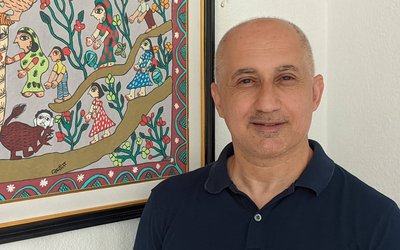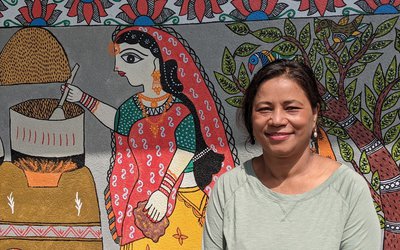PURUSHOTTAM GHIMIRE, joint secretary at the National Planning Commission, is a focal point of UNDESA+ Rio 20. Ghimire, who took part in previous four Conventions of Parties (COP) of United Nations Framework Convention on Climate Change (UNFCCC), spoke to NEW SPOTLIGHT on various issues regarding forthcoming Durban Meeting of UNFCC. Excerpts:
How do you look at the 17 UNFCC meet going to be held in Durban, South Africa?
Nepal has been participating in the UNFCC meet since 1995 but there were no records about Nepal’s participation and stands up to COP 13, which was held in Bali in 2007. I started to take part in UNFCC Conference of Party since Bali, which was known for its Bali Action Plan in the context of implementation of UNFCC resolution. Bali Action Plan focuses basically on four pillars that include mitigation, adaptation, financing and capacity building and transfer of technology. Nepal signed the declaration on 12 June 1992 and ratified it on 2 May 1994. Similarly, Nepal entered into force in 31 July 1994. The COP 13 was also important as it approved the long term cooperation action and the debate is going on regarding various important issues. The COP 14 which was held in Poznan discussed the issues raised in Bali Action Plan. It was only after the COP 15 which was held in Denmark’s capital Copenhagen the issue of Climate Change came into public limelight. Nepal too had got the headline by organizing the cabinet meeting at the Kalapathar above 5,000 meters in Everest region. Nepal’s prime minister Madhav Kumar Nepal led the big delegation of 84 members in the summit.
How do you measure the importance of Copenhagen summit?
One of the important achievements of Copenhagen was the Copenhagen accord which stressed for the sufficient finance for developing and least developed countries from developed countries specially to address the vulnerable people of developing countries. In Copenhagen, developed countries agreed to allocate 10 billion rupees per year from 2010 to 2012 and up to 2020 and up to 100 billion dollars. Fortunately, it was not implemented till now. If you recall the last year’s Cancun meeting, the parties agreed on climate change fund. The composition and proceeding of Green Climate Change Fund is not finalized and it will be finalized in coming Durban meeting. After finalization of the proceedings, the annex 1 countries are going to put the money. Basically the question of climate change is now each and every country’s issue.
How do you see the impact of climate change issue?
The impact of climate change has been a very serious in developed and developing countries, especially LDCs. If we look at the cases of Nepal, we are the fourth highly vulnerable among countries under the threat of climate change. If you see the changing pattern of weather, it has affected different areas, including food security, agriculture, forest, water resources and health. Basically, Nepal needs to save its mountains which give life to Nepal’s eco-system. Nepal’s Himalayas are not only important for Nepal but they are the water towers of South Asian region. More than 500 million peoples depend on the water. Himalayas are the sources of many big rivers as well as small rivers. The water scarcity is going to affect the region as well as the country. Our objective should be to save the water and Himalayas. We have several dimensions of water from no water to little water and the challenge is how one can distribute this water according to the needs.
Why is Durban summit important for us?
The forthcoming Durban Summit is important for Nepal as Nepal is chair of the LDCs group. Definitely, our UN ambassador will lead the team. I would like to see we request annex 1 countries to provide necessary fund for adaptation, and technology.
As you know, most of the countries which took part in the Cancun Summit were happy after its completion because most of the demands of the least developed countries are accepted there like Green Climate Change Fund, Technology Transfer. From Cancun to Durban, there is the need to build a foundation for the achievement we have made. Second important aspect is going to the future of the Kyoto Protocol. After 2012, if the Kyoto Protocol will not be continued what would happen on the responsibility of Annex 1 countries. If you see the UNFCC convention, it has clearly mentioned the responsibility of developed and developing countries. They have to act up to their capacity.
What would be the possible outcomes of Durban?
The major outcome of Durban will be to continue the Kyoto Protocol for the commitment of Annex 1 countries to continue. We need a legally binding document from Annex 1 countries and the problem is that Annex 1 countries are denying the legally binding document. There is no clarity about the green house gases and the funding is also not clear. Least developed countries and developing countries are in desperate need of funds. Some countries are talking about bilateral and others about multilateral funds. They have already allocated a fund but they are not available for the least developed countries. My question is: where is the fund and how do we get it?
We are facing the difficulties to acquire the fund. Implementation of green climate change should be the agenda and the fund is distributed according to the needs. Some of the countries are getting more funds and others are not getting them.
- TANAHU HYDROPOWER PROEJCT: A Significant Achievement
- Apr 15, 2024
- AMBASSADOR HANAN GODAR: Sharing Pain With A Nepali Family
- Mar 30, 2024
- VISIT OF KfW AND EIB TO NEPAL : Mission Matters
- Mar 25, 2024
- NEPAL BRITAIN SOCIETY: Pratima Pande's Leadership
- Mar 24, 2024
- NEPAL ARMY DAY: Time To Recall Glory
- Mar 15, 2024
















